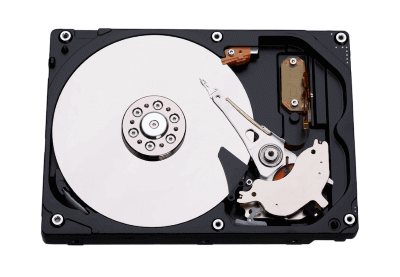Definition of hard disk
A hard disk is also known as a hard drive or fixed disk. It is said to be rigid magnetic disc that stores data. It is located within a drive unit. Hard disk is a non-volatile storage device that contains platters and magnetic disks rotating at high speeds. Non-volatile means the data retains when the computer shuts down.
It is installed internally in our computer systems. Hard disk is located within a drive unit on the computer's motherboard and comprises one or more platters packed in an air-sealed casing.

Its main components include a read/write actuator arm, head actuator, read/write head, spindle, and platter. A circuit board (also called as the interface board or disk controller) is present on the back of a hard drive. It lets the hard drive to communicate with the computer.
Function of Hard disk
The hard disk is a secondary storage device, which is designed to store data permanently. The secondary storage devices include a large storage capacity as compared to the primary storage devices. The data stored in a hard disk is retained when our computer system shuts down. The data stored in the hard disk can be of many types such as the operating system, installed software, documents, and other files of computer.
Hard disk was introduced in the year 1956 by IBM. The first personal computer contains a hard drive of less than 1 megabyte, while modern computers contain a hard drive of 1 terabyte.
Every computer contains atleast one hard drive to store data and software. In Windows operating system, the hard drive is known to be the C drive, and in MAC, it is simply called as the hard drive. The desktop computers which have external hard drives are used for backup purposes or additional storage.
The size of hard drives is measured in gigabytes and terabytes. Usually, 500GB hard disks are common in modern computers. As an instance, a song of length four-minute is approx. 4MB in size, and in 1 gigabyte, there are 1,000 megabytes, it means that a 500GB hard drive can store approx. 250,000 songs.
Let's see some advantages and disadvantages of the hard disk.
Advantages of the hard disk
The advantages of a Hard Disk Drive are given as follows:
- One of the significant advantages of a Hard Disk drive is that its cost is low.
- Another advantage of a Hard Disk is that it is readily available in the market.
- Hard Disk is faster than optical disks.
- The capacity for storing the data in HDDs is large.
Disadvantages of the hard disk
The disadvantages or limitations of Hard Disk Drive are given as follows:
- The speed of reading and writing in HDD is slower than the RAM.
- HDDs are noisy.
- Another disadvantage of HDD is energy inefficiency.
- HDDs consume more power.
- The form factor of HDDs is heavier than the SSDs.
The hard disks are robust and can be used for a long time. But hard disks can be crashed, and the main reason is head crash. If the hard drive is crashed, we may lose all our documents, photos, etc., stored in it.

Post a Comment